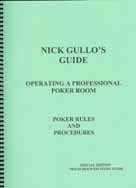
Nick Gullo's Guide: Operating a Professional Poker Room
Nick Gullo's Poker Room Guide Vital Reading as Game Grows
It's hard to believe one of the hottest areas in the history of gambling had a major information gap for management -- a book or guide on how to run a poker room -- until now.
Nick Gullo's Guide to Howard Schwartz, the "librarian for gamblers," is the marketing director for Gambler's Book Club in Las Vegas, a position he has held since 1979. Author of hundreds of articles on gambling, his weekly book reviews appear in numerous publications throughout the gaming industry. Howard's website is www.gamblersbook.com Operating a Professional Poker Room, with rules and procedures (134 pages, 8x11 plastic spiralbound, $39.95), which includes a Texas Hold'em Study Guide for beginners, was published recently to help those operating card rooms in every state, plus those who want to have a monthly event at places like bowling alleys or pool halls or country clubs, run things smoothly.
Howard Schwartz, the "librarian for gamblers," is the marketing director for Gambler's Book Club in Las Vegas, a position he has held since 1979. Author of hundreds of articles on gambling, his weekly book reviews appear in numerous publications throughout the gaming industry. Howard's website is www.gamblersbook.com Operating a Professional Poker Room, with rules and procedures (134 pages, 8x11 plastic spiralbound, $39.95), which includes a Texas Hold'em Study Guide for beginners, was published recently to help those operating card rooms in every state, plus those who want to have a monthly event at places like bowling alleys or pool halls or country clubs, run things smoothly.
The book, which contains 35 chapters and plenty of room to take notes or make revisions as needed for a particular situation, is written by a veteran of more than four decades in the casino industry. The book was also written to inform beginners who may need a ruling or explanation of a ruling and is helpful for those running a tournament.
After a brief introduction to hand values and betting terminology Gullo offers procedural advice applying to all poker games including the specific role the dealer has and situations where a dispute might occur, along with specific rules the House or persons operating a game or tournament might wish to post or list in their rules for players to be aware of immediately, especially those involving table etiquette, misdeals and when a player's hand is "dead."
Rules and checklists for the House to follow to keep the game honest; shuffling and the cut procedure are listed; rules on wagering; followed by rules employees must follow all make this a fine time-saving reference guide for card room management or those who hope to move on up from dealer.
Sections on the rake; rack chip rules; the responsibility of the chip runner and the brush person are followed by a major discussion and guidelines for dealing.
Small, but important sections examine situations like a player missing the big blind or small blind; general button procedures; kill pots.
Gullo has guidelines for the house and dealers to follow for most of the popular poker games: hold'em (seven pages); followed by seven stud; seven hi-low split eight or better; Omaha high; Omaha high low split eight or better; pineapple hold'em; razz; draw poker; triple draw low ball deuce to seven; high hand jackpots Texas hold'em and bad beat jackpots (which includes a sample jackpot report form so payments may be made accurately).
The section on Tournament Rules is one of the most important, with a good portion of the material drawn from the Tournament Director's Association, founded by Matt Savage, David Lamb, Linda Johnson and Jan Fisher five years ago.
This section includes an idea for card room promotion -- specifically the "poker diary" and how it will assist in marketing and customer loyalty and several sample forms worth considering for record-keeping.
This is an outstanding professional effort by an individual who deeply cares about the gaming industry, particularly now, about poker and how players should be treated.
I'm sure there will be suggestions for additions and updating certain areas to keep up with the ever-changing nature of the games, but this book is one heck of giant step in the right direction.
